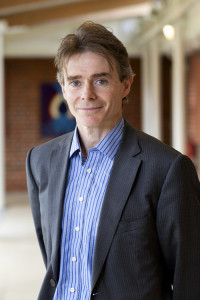 The Human Mind Project launched on 12 December 2013 with a public evening panel session held at Senate House, London. The project seeks to co-ordinate an international effort to define the major intellectual challenges in understanding the nature and significance of the human mind. Central to its success is collaboration across conventional disciplinary boundaries.
The Human Mind Project launched on 12 December 2013 with a public evening panel session held at Senate House, London. The project seeks to co-ordinate an international effort to define the major intellectual challenges in understanding the nature and significance of the human mind. Central to its success is collaboration across conventional disciplinary boundaries.
In the lead up to the launch event the School of Advanced Study have conducted a series of short interviews with the initial project team to learn more about what they hope to achieve. This interview is with Paul Fletcher, a psychiatrist from the University of Cambridge.
First of all, could you tell us a bit about yourself and your area of research?
I am a psychiatrist. I try to understand and help people who suffer from psychotic illness. Psychosis refers to a loss of touch with reality. People with psychosis hold and defend strange and often frightening beliefs (referred to as delusions) and they perceive things (perhaps visions or voices – often referred to as hallucinations) that cannot be accounted for objectively.
My research is based on two core beliefs:
a. It is mistaken to consider the symptoms of psychotic illness in isolation. We should acknowledge that perception and belief are not separate – every perceptual experience is an act of belief and is heavily based on what one already knows. This has long been known in physiology but seems often to be missing in psychological models of delusions and hallucinations.
b. Perception/belief in the healthy state almost always diverges from objective reality. The brain is a very deceitful organ, doing much of its processing in secret and offering up to consciousness a pre-digested summary of the world around us. With this in mind, the state of psychosis is not as bizarre as we might think.
My work involves the use of subjective, psychophysical and brain imaging measures in people with psychotic illness and in healthy volunteers receiving an infusion of a drug that causes such symptoms in mild and transient form. I want to unite several levels of explanation – from the brain to cognition to social context – in pursuit of an improved understanding of how psychotic symptoms arise and develop because an explanation that neglects any of these levels, or assigns undue privilege to one above the others, will prove inadequate.
The Human Mind Project is a collaborative venture between the humanities and the sciences. What do you think are the particular opportunities and challenges for this type of collaboration?
An understanding of psychosis, indeed of the mind, must ultimately emerge at multiple levels: at one end, we have the observations of single neurons and of how they act in ensembles and circuits and how the relationships between cells and systems enable computation and information processing. At the other end, we must understand how brains interact with the environment and with other brains. While specialisation is necessary and inevitable, the field of psychiatry has already demonstrated the difficulties posed by a balkanised discipline in which some people ignore the brain and others ignore the environment.
What do you hope the Human Mind Project will achieve?
I hope that it will offer an opportunity to synthesise insights from different levels of description and explanation. Bringing together research in several areas of brain and mind sciences with insights from the humanities will offer new ways of thinking about long-standing puzzles. In particular, I feel that my own work on mental illness has much to gain from enhanced understanding of people’s actions and experiences in the social domain since understanding symptoms of psychosis, and the suffering that they cause, must entail scrutiny of their impact on social interaction and of the isolation and exclusion that they cause.
Is there anything else you would to share?
I have long had a feeling that there are more insights to the human experience in a chapter of George Eliott than there are in whole textbooks of psychology and cognition.
The Human Mind Project is an international collaboration including the Institute of Philosophy (SAS). For full details check the Human Mind Project website.
SAS hosts more than 1,800 events each year – the majority of which are free and open to all. Search our events calendar or sign up to our mailing list for the latest information.
